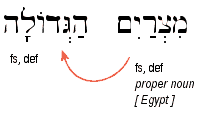|
|
||||||||||||||||||||||
 |
||||||||||||||||||||||
|
Learn Hebrew |
||||||||||||||||||||||
 |
||||||||||||||||||||||
|
Audio Tanakh |
||||||||||||||||||||||
 |
||||||||||||||||||||||
|
Hebrew Training |
||||||||||||||||||||||
|
The Attributive Usage of Adjectives
|
|
|
The Standard Attribute Adjective Paradigm |
|
|
|
|||||||
|
Hebrew for Christians |
|||||||
|
|||||||







